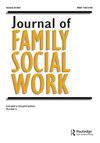前言
IF 0.7
Q3 SOCIAL WORK
引用次数: 0
摘要
欢迎收看JFSW第二十六卷第二期。本期包括三篇关于养育子女和家庭面临的多代问题的文章。第一篇文章题为《衡量神经残疾儿童养育计划中的家庭结果:Jeffrey McCrossin和Lucyna Lach撰写的范围界定综述》,研究了如何在为神经残疾儿童提供养育服务的父母计划中衡量家庭层面的结果。此类育儿计划被视为标准护理,推进相关结果的概念化和衡量可以为改进计划提供信息。他们的综述包括29项研究,作者建议通过评估项目理论框架所提供的家庭结果的其他方面,超越简单的评估儿童和父母的幸福感。第二篇文章由Justyna Sieminow撰写,标题为《成年罪犯眼中的父母和家庭:定性研究》。通过分析从10名男性囚犯身上收集的关于做父亲、自己的童年和成长的访谈数据,作者提出了建议,让被监禁的父亲在获释后做好养育子女的准备,以减少他们孩子未来的行为问题。第三篇文章由努尔·穆罕默德·侯赛因和苏齐安娜·亚辛撰写,标题为《Elopement及其对家庭制度的影响:社会文化视角》。这项定性研究涉及采访马来夫妇对私奔的看法,并从社会文化的角度分析这些数据。在马来文化中,私奔通常被宗教和法律视为对价值观的侵犯。作者呼吁进行更多的研究。这三篇文章共同探讨了来自不同国家和文化的家庭所面临的问题,以及他们正在应对各种各样的、非常困难的斗争。本文章由计算机程序翻译,如有差异,请以英文原文为准。
Preface
Welcome to the second issue of the twenty-sixth volume of JFSW. Included in this issue are three articles addressing parenting and multigenerational issues confronting families. The first article, titled Measuring Family outcomes in parenting programs for children with neurodisabilities: A scoping review authored by Jeffrey McCrossin and Lucyna Lach examines how family-level outcomes are measured within parents programs delivered to parenting of children with neurodisabilities. Such parenting programs are considered standard care and advancing how related outcomes are conceptualized and measured can inform improved programming. Their review included 29 studies and the authors make recommendations to move beyond simply assessing child and parent well-being by assessing other aspects of family outcomes informed by a program’s theoretical framework. The second article, authored by Justyna Siemionow, is titled Parenthood and family in the opinions of adult offenders: Qualitative study. Analyzing interview data collected from ten male prisoners about being fathers and their own childhoods and upbringing, the author makes recommendations for preparing imprisoned fathers for parenting upon release in order to reduce future behavior problems in their children. The third article is authored by Nur Mohamed Hussin and Suziana Yasin and is titled Elopement and its implications to a family system: A sociocultural perspective. This qualitative study involved interviewing Malay couples about their perceptions of elopement and analyzing that data through a sociocultural perspective. In Malay culture elopement is typically seen through religious and legal lenses as a violation of values. The authors call for more research. Together these three articles offer a diverse look at issues that confront families from different countries and cultures, and who are coping with varied and very difficult struggles.
求助全文
通过发布文献求助,成功后即可免费获取论文全文。
去求助
来源期刊

Journal of Family Social Work
SOCIAL WORK-
CiteScore
2.10
自引率
0.00%
发文量
4
期刊介绍:
Each issue of the Journal of Family Social Work contains peer reviewed research articles, conceptual and practice articles, creative works, letters to the editor, and book reviews devoted to innovative family theory and practice subjects. In celebrating social workers" tradition of working with couples and families in their life context, the Journal of Family Social Work features articles which advance the capacity of practitioners to integrate research, theory building, and practice wisdom into their services to families. It is a journal of policy, clinical practice, and research directed to the needs of social workers working with couples and families.
 求助内容:
求助内容: 应助结果提醒方式:
应助结果提醒方式:


